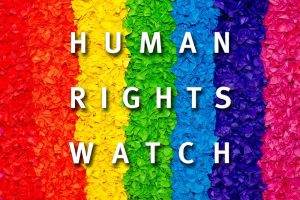Click to expand Image
A Burkina Faso soldier stands guard in an armored vehicle in the capital, Ouagadougou, October 2, 2022.
© 2022 REUTERS/Vincent Bado
(Nairobi) – Burkina Faso authorities should urgently and impartially investigate a video posted on social media showing Burkinabè army soldiers mutilating and disemboweling a dead body, Human Rights Watch said today. All those found responsible for wrongdoing should be appropriately prosecuted, regardless of their rank.
The video, which circulated on social media in late July 2024, shows at least 18 men, wearing identifiable army uniforms, standing by while 2 use knives to disembowel a decapitated and dismembered human body. In a July 24 statement, the Burkinabè army chief of staff, Maj. Col. Célestin Simporé, condemned “these macabre acts at the opposite ends of moral and military values.” He claimed that “steps have been taken” to find the location of the footage and those responsible but did not announce a criminal investigation.
“The gruesome video showing soldiers mutilating a body underscores the pervasive lack of accountability for atrocities that military units have committed in Burkina Faso in recent years,” said Ilaria Allegrozzi, senior Sahel researcher at Human Rights Watch. “Burkinabè authorities should immediately open a transparent and impartial investigation of this brutal incident and appropriately punish all those responsible.”
Human Rights Watch reviewed the 81-second video, interviewed 5 people with knowledge of the incident, and received expert assessment from a physician specializing in forensics. Technical experts in media forensics also analyzed the video file.
In the video, a man in an army uniform with a distinctive Burkina Faso flag on his left shoulder is seen leaning over the mutilated body on the ground. A head lies nearby, alongside the body of a second dead person. The uniformed man plunges a knife into a point just below the sternum and starts cutting. He then plunges his arm into the cavity and appears to be trying to remove body parts without success.
Another man in an army uniform, using what appears to be a small sword, makes cuts into the body, hacking at the sternum 24 times, opening the body’s chest. The first man then takes his knife and cuts what appears to be an organ out of the body. He stands holding the organ while others in army uniform crowd around him. Some exclaim in French, “La patrie ou la mort!” (For the homeland or death!): a common Burkinabè slogan linked to the late Burkinabè revolutionary leader, Thomas Sankara, in the 1980s and adopted by the current military junta.
Four of the men wear the colors of the Burkina Faso national flag on the left lapel of their military jackets or t-shirts, consistent with the Burkinabè military uniform. The men in uniform can be heard saying in French that they are members of the Rapid Intervention Battalion 15 (Bataillon d’Intervention Rapide, BIR-15), a special force involved in counterinsurgency operations against Islamist armed groups, and of the army unit “Cobra 2,” an elite force associated with Burkina Faso’s president, Ibrahim Traoré.
Many of the men shown in the video are carrying Kalashnikov-style assault rifles and are wearing protective tactical vests. Three are wearing military helmets. Their equipment is consistent with that seen in a video published on YouTube in December 2023 by Burkinabè state television to announce the creation of new Rapid Intervention Battalions. The man who appears to remove the organ is carrying a pistol.
In November 2022, President Traoré created six Rapid Intervention Battalions to support military operations against Islamist armed groups. The number of these special forces units has since quadrupled to at least 25. BIR-15 was created by presidential decree on October 25, 2023, and Traoré appointed Capt. Paul Belem as its commander two days later.
The Burkinabè media have reported that BIR-15 is stationed in Gaoua, South-West region, suggesting that the video might have been filmed there, or in surrounding regions, all of which have been affected by the conflict. Two sources, including one close to the army, told Human Rights Watch that the video was filmed between April and May near Nouna, in the Boucle du Mouhoun region.
Human Rights Watch was not independently able to identify where and when the video was filmed, but the languages heard in the video – French, Moore, and Bobo – and the military uniforms worn by the group involved suggest a Burkina Faso location. Human Rights Watch found no version of the video available online before July 23, 2024. Experts in media forensics and artificial intelligence generation and manipulation from the Deepfakes Rapid Response Force, an initiative of WITNESS, a nongovernmental organization, analyzed the video file and concluded that there was no significant evidence of AI manipulation.
The army chief said in his statement that the men in the video were “alleged members of the Burkinabè defense and security forces and of the Volunteers for the Defense of the Homeland (Volontaires pour la défense de la patrie, VDPs).” These are local civilian auxiliaries, first used in 2020, who accompany soldiers during their operations. Since taking power in a September 2022 coup, President Traoré has increased the use of VDPs, and in October 2022, he began a campaign to recruit 50,000 more. The uniforms and the equipment of the men in the video appear to confirm the involvement of defense and security forces, Human Rights Watch said.
In Burkina Faso’s armed conflict, both government security forces and Islamist armed groups have committed numerous atrocities with impunity, fueling cycles of abuse and retaliation. Human Rights Watch has previously documented serious human rights abuses by Rapid Intervention Battalions and VDPs, including the massacre of at least 156 civilians, including 45 children, in the village of Karma, Yatenga province, in April 2023. BIR soldiers were also implicated in the summary executions of at least 223 civilians, including 56 children, in the villages of Soro and Nondin in February.
Burkina Faso government forces have been fighting the Al-Qaeda-linked Group for the Support of Islam and Muslims (Jama’at Nusrat al-Islam wa al-Muslimeen, JNIM) and the Islamic State in the Greater Sahara (ISGS) since the armed groups entered the country from neighboring Mali in 2016. The groups control large swathes of territory in the country, have attacked civilians as well as government security forces, and have also fought each other. The conflict has killed thousands of people since 2016 according to the Armed Conflict Location & Event Data Project (ACLED), a disaggregated data collection, analysis, and crisis-mapping project, and forced over two million people from their homes.
Customary international humanitarian law applicable to the conflict in Burkina Faso prohibits the “mutilation of dead bodies.” Mutilating bodies in non-international armed conflicts is the war crime of “committing outrages upon personal dignity” under the Rome Statute of the International Criminal Court (ICC), to which Burkina Faso is a party. Under international human rights law, the United Nations Human Rights Committee has indicated that the disrespectful treatment of human remains may amount to cruel, inhuman or degrading treatment of the family of the dead.
“The Burkinabè authorities should rein in abusive military units and civilian auxiliaries and fully investigate and prosecute those implicated in abuse,” Allegrozzi said. “Concerned governments need to press the military junta to put an end to the atrocities like those found in the video.”





